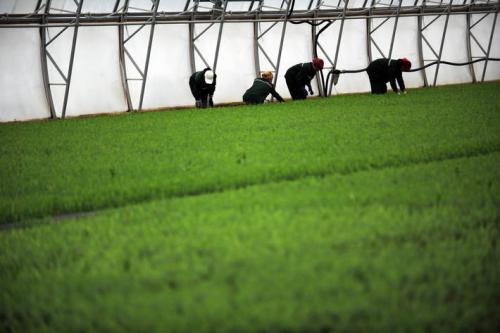Agriculture & BRICS: Reforms and Resistance
This policy brief examines the status of food and agriculture in three of the BRICS nations – Brazil, South Africa and India to discuss the potential implications for future multilateral cooperation.
- Análisis

Food and agriculture play an important role for the BRICS nations given their combined prowess in agricultural output and trade. The countries also house a large agrarian community with several peasants, fisherfolk, workers and indigenous peoples dependent on agriculture for their livelihood. The pandemic has provided an important juncture for these emerging economies to re-examine global value chains and policies that affect agrarian livelihoods, food security, nutrition and sustainability. However, the 2021 BRICS summit leaves us wanting in terms of policy and accountability for the devastating consequences of COVID-19 on the agrarian landscape.
This policy brief examines the status of food and agriculture in three of the BRICS nations – Brazil, South Africa and India to discuss the potential implications for future multilateral cooperation.
Introduction
The 13th Summit of the BRICS (Brazil, Russia, India, China and South Africa) nations was held in India, on 9 September 2021. The Summit was also the 15th anniversary of the yearly BRICS meetings and was organised on the theme, ‘Intra-BRICS Cooperation for Continuity, Consolidation and Consensus.’ BRICS ministerials address various strategic areas including public health, environment, science and technology, security and agriculture.
The volume of trade in agricultural commodities and among large agrarian communities in these countries makes agriculture a key area of cooperation. Food security, sustainable cultivation and agricultural markets also play a fundamental role in achieving development goals. In 2019, the BRICS ministerial on agriculture made a call for more ICT and technology based solutions which culminated in the ‘Operationalisation of the BRICS Agriculture Research Platform.’ The main aim of such a platform is to “intensify cooperation in the areas of agricultural research, technology, policy, innovations and capacity building including technologies for smallholder farming and to sustainably increase yields and farmers income in the BRICS member countries.” Given the large impact of the emerging BRICS economies on the global agricultural value chain these partnerships require more scrutiny, especially in the aftermath of a devastating pan[1]demic.
The Peoples’ Forum on BRICS is an attempt to gather workers, citizens, organisations and academics to discuss practises, challenges and solutions that are otherwise ignored in the official Summit. In collaboration with the Peoples’ Forum on BRICS the Focus on Global South organised a civil society dialogue on the status of agriculture in these emerging economies including a discussion on the ground-level impact of the pandemic on farmers, fisherfolk, pastoralists and indigenous people. The discussion was held virtually with participants from Brazil, India and South Africa talking about the various agricultural reforms in their countries, their impact and peoples’ response and resistance.
Continue reading below.
Source:
https://focusweb.org/wp-content/uploads/2022/02/2022_02_agriculture-and-brics.pdf
Del mismo autor
- Agriculture & BRICS: Reforms and Resistance 22/02/2022
